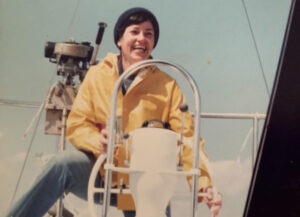Grace Evans
40 Years, 40 Stories

GRACE EVANS, ORIENTAL
“Most of our problems for the river have always been, and now certainly are, from the land.”
The words are those of Grace Evans, who, over the last 40 years, has been instrumental in the fight for clean water on the lower Neuse River.
A lifelong sailor, the wide waters of the Neuse brought her to Oriental in the 1960s; by 1972, she decided to make the riverside town her permanent home and would go on to run two sailing schools.
“We swam, we didn’t get infections. We fished and floundered, just really enjoyed the river and didn’t think particularly of what it might contain. The river had plenty of fish and wonderful sailing,” Evans said.
But over time, the trash began piling up: creeks the dumping ground for household appliances; the river, a garbage receptacle for day-boaters. Then came the algal blooms and fish kills, and by 1980, when the Neuse River Foundation was founded, Evans was on board with its mission.
“Even though I made my living on the river, I also used it for my recreation. Every part of my life had to do with the river,” she said.
As an early member of the young environmental organization, Evans said she received an education on the urgent issues facing local waterways.
“It was just becoming aware myself of what was happening, and then making other people aware of it, too,” Evans said.
Those early members met in living rooms and in offices loaned for the occasion, before making the Neuse River Foundation’s first home in a trailer in Bridgeton. NRF petitioned the state to ban phosphates in cleaning products, the same phosphates that were throwing off the river’s natural balance, and won that battle. They built an army of creekkeepers — those who knew their waterways best — to keep tabs on polluting. Then, with a push from Evans, NRF made a pioneering step in honing its mission.
“We hired the first Riverkeeper in North Carolina, Rick Dove, and he was very effective. He was completely dedicated to the projects — nitrogen loading, animal farms, what the state was allowing different sewage treatments to do,” Evans said.
At 90 years old, Evans remains passionate about the work the Neuse River Foundation has done for the past 40 years, and that Sound Rivers continues today. Despite four decades of advocacy and education, she believes the work is far from over; an evolving array of issues continue to plague the waterways, from the sources of ongoing fish kills to sea-level rise and flooding.
“It used to be septic tanks, now it’s industrial farms,” Evans said. “What I’d like to see is much more awareness of what is happening on the land, and how what’s happening on the land affects the river.”
